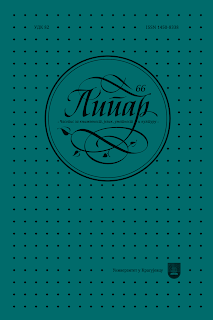КУЛТУРОЛОШКО СУПРОТСТАВЉАЊЕ БАЛКАНА И ЕВРОПЕ СА ОСВРТОМ НА РУКОПИСЕ ИСИДОРЕ СЕКУЛИЋ О БАЛКАНУ
THE CULTURAL OPPOSITION OF THE BALKANS AND EUROPE WITH A REVIEW OF ISIDORA SEKULIĆ’S MANUSCRIPTS ON THE BALKANS
Author(s): Ivana Stojanović ŠešlakSubject(s): Language and Literature Studies, Studies of Literature, Serbian Literature, Philology
Published by: Универзитет у Крагујевцу
Keywords: the Balkans and Europe;cultural opposition;Milica Bakić-Hayden;Maria Todorova;Isidora Sekulić;stereotypization
Summary/Abstract: The Balkans are often designated in the imagination of Western Europe and consequently the greater part of the world as a backward, uncultured and uncivilised region frequently associated with violence. Therefore, it is usually compared to a gunpowder barrel waiting for a spark. Because of this, we are witnessing the birth of a new term, Balkanization, which makes the subject at hand very current. Scientific studies deal with these relations based on Edward Said’s concept of Orientalism and postcolonial theory. This essay is an attempt at a comparative analysis of Milica Bakić Hayden’s Variations on the Subject of the Balkans and Maria Todorova’s Imagining the Balkans. Hayden prefers the use of Said’s concept of Orientalism as a basis for the study of these relations and is against understanding and representing the Orient as unfathomable, taking India as an example (“The Jewel in the Crown” for the British). Unlike Hayden, Todorova introduces a new concept, Balkanism, derived from Orientalism, but more specific to the given subject. Both authors notice the existence of numerous stereotypes involved in the designation of the Balkans as well as the fact that it is often viewed in the light of its Ottoman heritage alone. Isidora Sekulić’s manuscripts The Balkans, although decades old, are nevertheless imbued with the actuality of the present moment, in which this cultural opposition is best seen through the great vs. small nations relations. This essay aims to point out the already existing stereotypes about the Balkans as well as the need to be careful when attempting to perceive the culture of a nation or a national minority. It aims to bring attention to the specificity of the region as well as to the capacity for transformation of the many lines of division within the Balkans and Europe itself.
Journal: Липар - часопис за књижевност, језик, уметност и културу
- Issue Year: XIX/2018
- Issue No: 66
- Page Range: 55-73
- Page Count: 19
- Language: Serbian

